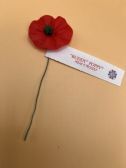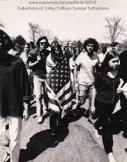Memory and Memorial
By the time you read this, Memorial Day will have come and gone. I try to pay it the appropriate attention. Like many Maine families (and others), I know scores, both alive and dead, who served: my father and grandfather, my uncles, even two of my nephews. My mother-in-law was a Marine, about which we do not joke.
I associate Memorial Day most memorably with the sweet bready smell of blooming lilacs, but also with veterans handing out red plastic poppies, student marching bands, and old faded men in old faded uniforms marching into the long moments of silence.
student marching bands, and old faded men in old faded uniforms marching into the long moments of silence.
Only a week later, I returned from my 50th college reunion at that well-known liberal arts school in central Maine, and I will skip the obligatory joke about how old all those other people looked. I will say that, by show of hands, there were many more joint replacements than tattoos. Not that there were no tattoos.
The highlight of the weekend for me, faintly macabre as it sounds, was the memorial service one of my classmates arranged for the forty-six members of our class who have died. Better than ten per cent of the freshman class, and if that number didn’t give people pause, nothing else would.
The remembrance consisted of a reader speaking the name of each person who was gone, then a friend or acquaintance of that person picking a red rose from a pail and placing it into a bouquet  that would collectively represent everyone we had lost. We would carry the bouquet with us to dinners and events for the rest of the weekend.
that would collectively represent everyone we had lost. We would carry the bouquet with us to dinners and events for the rest of the weekend.
In 1969, when we all were first on campus, like any group of young people, we divided ourselves into groups: the jocks, the freaks, the science nerds, the brains, the party people, the frat boys and the sorority girls. It was a strange and divisive time, deep into the Vietnam War,  steeped in conflicts over civil rights and gender politics. At the same time, we loved our beer, dancing badly to the Rolling Stones, and all the other escapades that make the privilege of college life so dear in the moment.
steeped in conflicts over civil rights and gender politics. At the same time, we loved our beer, dancing badly to the Rolling Stones, and all the other escapades that make the privilege of college life so dear in the moment.
What struck me deeply in the memorial was that nearly all of our dead classmates had someone to add a rose for them, and that many—most—of the connections crossed those strange and arbitrary lines we had drawn when we were younger and more foolish. It became clear that, if nothing else, the passage of time teaches you to suspend your judgments, weaken your prejudices, open up your assumptions to new information. It was moving to see how many of those old disconnections had faded.
Which would be lovely if all of us lived long enough to do that for each other. But just in the group of my classmates, some died while they were students, others in only their twenties and thirties. I was reminded that we don’t always have the time we think we have to act better than we have. Which is all the more reason to loosen our self-imposed boundaries, to cross over the divisions we have fashioned for ourselves, to open up our selves to the possibility we might be wrong about something. Or someone. What would be fine, I think, is if you could bring someone a rose, or a poppy, before someone needs to bring one for you.
Lea Wait's Blog
- Lea Wait's profile
- 509 followers



